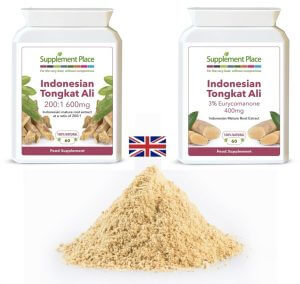

Ashwagandha, an ancient herb used in Ayurvedic medicine has gained popularity for its reputed calming effects. The herb is often lauded for its ability to reduce anxiety and improve resilience against stress.
However, like many remedies, it’s not without potential side effects.
While Ashwagandha may be beneficial to reduce anxiety and stress, some users report feeling emotionally numb or detached—an effect that bears a striking resemblance to SSRI-induced numbness or sedative effects.
This article will take a closer look at Ashwagandha’s benefits, risks, and alternatives to help you make an informed choice about incorporating it into your wellness routine.
Ashwagandha, scientifically known as Withania somnifera, is an adaptogenic herb that helps the body adapt to physical, chemical, and biological stressors. The main active compounds in Ashwagandha, withanolides, are believed to have impact on stress and anxiety by influencing the hypothalamic-pituitary-adrenal (HPA) axis, which regulates the body’s stress response.
As a result, Ashwagandha’s effect on reducing anxiety is closely associated with reducing cortisol through the hypothalamic-pituitary-adrenal (HPA) axis.
According to Dr. Sarah Ellis, a holistic health expert, “Ashwagandha helps in modulating cortisol levels, which is our body’s primary stress hormone. When cortisol is kept in check, individuals often feel less anxious and more relaxed.”
It calms me down but I won’t recommended taking it long term as a daily or sports supplement.
For Simon who are taking Ashwagandha to calm his social anxiety said that it helped him short-term, but taking it more than 6 weeks cause some level of emotional numbness – a feeling of detachment from your surrounding actions.
There are plenty of studies to back up Ashwagandha’s effect on anxiety. However, if you are diagnosed with chronic panic disorder, social anxiety disorder, agoraphobia, separation anxiety disorder, illness anxiety disorder or obsessive-compulsive disorder, Ashwagandha offer a temporary relief but may not be the permanent solution.
Multiple research studies compiled by the Journal of Clinical Psychology found that individuals taking Ashwagandha experienced a 30% reduction in stress scores compared to the placebo group. This herb’s effects have even been compared to low-dose SSRI (Selective Serotonin Reuptake Inhibitors) medications, as it appears to help stabilize mood and reduce stress by surpresing the production of cortisol.
For managing anxiety, experts suggest taking between 250-600 mg of Ashwagandha extract daily. This dosage is generally well-tolerated, although higher doses may amplify its side effects.
“Stick with around 300 mg to start and monitor how your body responds,” advises Mark Jonas, a health coach specializing in herbal supplements.
“Taking too much of Ashwagandha can heighten sedative effects, leading to feelings of sluggishness or emotional detachment. I won’t recommend if you are healthy or active” He added.
While Ashwagandha can help reduce anxiety, it isn’t without drawbacks. Some TikTok and Twitter users report a unique, often disturbing side effect: emotional numbness.
“I’ve had clients describe feeling disconnected or indifferent after starting Ashwagandha,” says Dr. Ellis. “They become calm, but it’s a bit like the calm of apathy rather than tranquility.”
The effects of reducing stress hormone (cortisol) from taking Ashwagandha may cause unnatural sedative-like experience, making it a major complaint by most users.
This emotional flattening is often compared to the effects some people experience with SSRIs. Like SSRIs, which can blunt both positive and negative emotions by altering serotonin levels, Ashwagandha may have a sedative-like impact on the brain’s receptors that regulate mood and emotions.
Research suggests that high doses could potentially dampen cognitive functions, leading to brain fog or a sense of dissociation from one’s emotions. Health experts warned against taking high dose of Ashwagandha if you are chronically stressed, and this that may affect your work productivity or sports performance due to emotional numbness.
Unless you want to feel sluggish or sedated, taking Ashwagandha before your sports activities is a bad idea. Stick to proven energy-boosting herbs such as Tongkat Ali.
In addition, more TikTok users reported that Ashwagandha may make you emotionally numb in the same way some antidepressants are reported to dull emotional intensity. This effect might be desirable for individuals with intense anxiety, but for others, it can feel disconcerting and unnatural.
In addition to emotional blunting, other possible side effects include:
Alternative Herbs for Reducing Anxiety
If the potential downsides of Ashwagandha seem concerning, there are several other natural options worth exploring. Unlike Ashwagandha, these herbs tend to support anxiety relief without the same risk of emotional numbness.
While Ashwagandha is a powerful herb with significant potential benefits, it’s essential to approach it with caution.
You may take in small doses of 200-500 mg if you are feeling anxious, but individual responses can vary. Be mindful of your own reaction, and if you notice signs of emotional blunting, consider reducing the dosage or switching to an alternative herb such as Tongkat Ali.
Consulting with a health professional can provide further guidance based on your unique needs and mental health goals.
As Dr. Ellis concludes, “Natural doesn’t always mean safe or side-effect-free. Herbs are powerful; they can shift brain chemistry and emotional responses in subtle but impactful ways.”
For those seeking a balance between anxiety relief and emotional well-being, consider starting with a conservative dose of Ashwagandha—or even exploring alternatives such as Tongkat Ali for a gentler, uplifting effect without the risk of emotional numbness.

Alex Kua leads AKARALI’s Global Partnership Community to help athletes, sports communities, and thousand of others optimize their well-being through evidence-based research that enables them to make better informed decisions. His legal and business consulting background underpins the rigorous data-driven approach in his writing – from hours of interviews, real-world performance data, and firsthand experiences of real people – offering actionable insights that connects clinical research, emerging health trends, and real-world applications. He is also an experienced researcher in herbal nutrition, with years of deep technical knowledge on Tongkat Ali (Eurycoma longifolia), including quality standards, industry benchmarks, lab tests, clinical trials, and the use of natural herbs by collaborating with top scientists, herbal experts, and nutritionists. As part of the core team behind AKARALI’s knowledge portal, he empowers people worldwide to access the benefits of high-quality herbal nutrition in a way that is effective, sustainable, and safe. He is also an avid runner, with regular participation in local sports communities and running events.
Our articles are third party reviewed by our panel of experts and medical advisors to ensure the facts are accurate and credible. These are validated against multiple source references which include but not limited to research studies, peer-reviewed journals, pre-clinical studies, clinical tests and other credible publications.
Our panel of medical advisors and experts are highly experienced in their individual fields. However, they do not provide any medical advice or recommendations arising from content published in this article.
Disclaimer:
The content published on this website is for educational purposes and should not be viewed, read, or seen as a prescription or constitute any form of medical advice. We recommend you consult your nearest GP or doctors before consuming Tongkat Ali or any products which contain Tongkat Ali. For further information, kindly refer to our Frequently Asked Questions (FAQ) for more information.